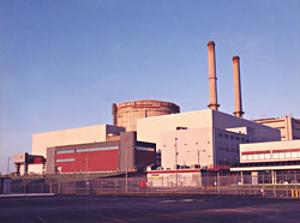Florida Approves First Nuclear Power Plant in 33 Years
TALLAHASSEE, Florida, August 11, 2009 (ENS) – The Florida Cabinet today approved site certification for Progress Energy Florida's Levy nuclear power plant, the first nuclear facility approved in the state since 1976.
Governor Charlie Crist, Attorney General Bill McCollum and Chief Financial Officer Alex Sink, serving as the Siting Board, unanimously approved Progress Energy Florida's site request for construction of a nuclear facility on a 3,105-acre location in Levy County.
"Today's decision proves that Florida is on the right path toward achieving energy diversity and independence," said Governor Crist. "I applaud Progress Energy Florida for its commitment to producing alternative energy options, creating jobs and protecting our environment for future generations."
The site certification application includes a detailed analysis of the potential environmental impacts of the proposed plant, which will consist of two 1,100 megawatt nuclear powered units, and related transmission lines.
On December 18, 2008, Progress Energy announced it will retire the two oldest coal-fired units at the Crystal River Energy Complex in Citrus County after a new, advanced-design nuclear plant is built in Levy County. Doing so will reduce the company's carbon dioxide emissions by more than five million tons per year, which the company says is the equivalent of removing more than 830,000 vehicles from Florida's roads.
 |
The nuclear reactor at Crystal River Energy Complex (Photo courtesy NRC) |
The Crystal River Energy Complex, with four coal-fired units and one nuclear unit, is one of the largest generating facilities in the country.
The Siting Board's approval of the Levy nuclear plant includes a requirement for the coal-fired units to be discontinued by December 31, 2020, assuming timely licensing and construction.
"Today's approval by the Siting Board is a significant step in the process to construct and operate the facility," said Michael Sole, secretary of the state Department of Environmental Protection, DEP. "We are pleased that Florida companies are seeing the value of a clean and diverse energy future and are investing in energy technologies to help preserve and protect our state's valuable natural resources."
Federal approvals and permits required prior to construction include National Pollutant Discharge Elimination System, which is an effluent and stormwater discharge permit; Prevention of Significant Deterioration, an air quality permit; approval by the U.S. Nuclear Regulatory Commission and also by the U.S. Army Corps of Engineers.
Today's vote is the second of three major approvals needed before the company can begin building the nuclear plant. In July 2008, the Florida Public Service Commission approved the "needs case" for the plant.
The last remaining major decision is from the Nuclear Regulatory Commission, which is expected by early 2012.
"This is an important milestone for the proposed Levy plant," said Vincent Dolan, Progress Energy Florida's president and chief executive officer.
"Carbon-free nuclear power is a strategic asset in our statewide effort to become energy-independent, to reduce our reliance on more volatile-priced fossil fuels, and to provide a balanced approach to meet the challenges of growth and climate change," Dolan said.
If approved and built, the project would be among the first nuclear plants in the country to be constructed on a greenfield site in more than 30 years, and it would involve development of one of the single largest transmission infrastructure projects in Florida's history, the company says.
Nuclear power plants produce electricity through a heat-generating process known as fission, in which neutrons split uranium atoms to produce large amount of energy. These facilities produce minimal carbon dioxide emissions, which contribute to climate change.
In the United States, 104 nuclear reactors supply roughly 20 percent of the nation's electricity.
Florida already has five operating nuclear reactors at three locations, including Crystal river. The others are two reactors at Turkey Point, 25 miles south of Miami, and two at St. Lucie, seven miles southeast of Fort Pierce.
For nuclear power critics the key issues are - nuclear plant safety, the safe disposal of nuclear waste, potential sabotage and attack on facilities, and the risk that nuclear power will help more nations and terrorists acquire nuclear weapons.
The nonprofit Environment Florida is conflicted about permitting more nuclear power in the state. Back in 2007, in advance of Governor Crist's summit to develop a plan for Florida to battle climate change, Environment Florida said, "It's time for the state to take another look at nuclear energy, long a taboo but something that could play a role in the anti-warming cause, providing all safety questions are satisfactorily answered."
But just a year earlier, in 2006, the statewide environmental group said, "A 'nuclear renaissance' would be a bad deal for American consumers, the environment, public safety and national security. Nuclear power is an expensive and risky way to address global warming - especially when compared to alternatives such as improved energy efficiency and the expansion of renewable energy production."
"Moreover," said Environment Florida in 2006, "the nuclear industry's shoddy safety record and insufficient response to the growing threat of terrorism suggest that new nuclear power plants - or the continued operation of aging plants - could cause more problems than they solve."
Copyright Environment News Service (ENS) 2009. All rights reserved.
To subscribe or visit go to: http://www.ens-newswire.com